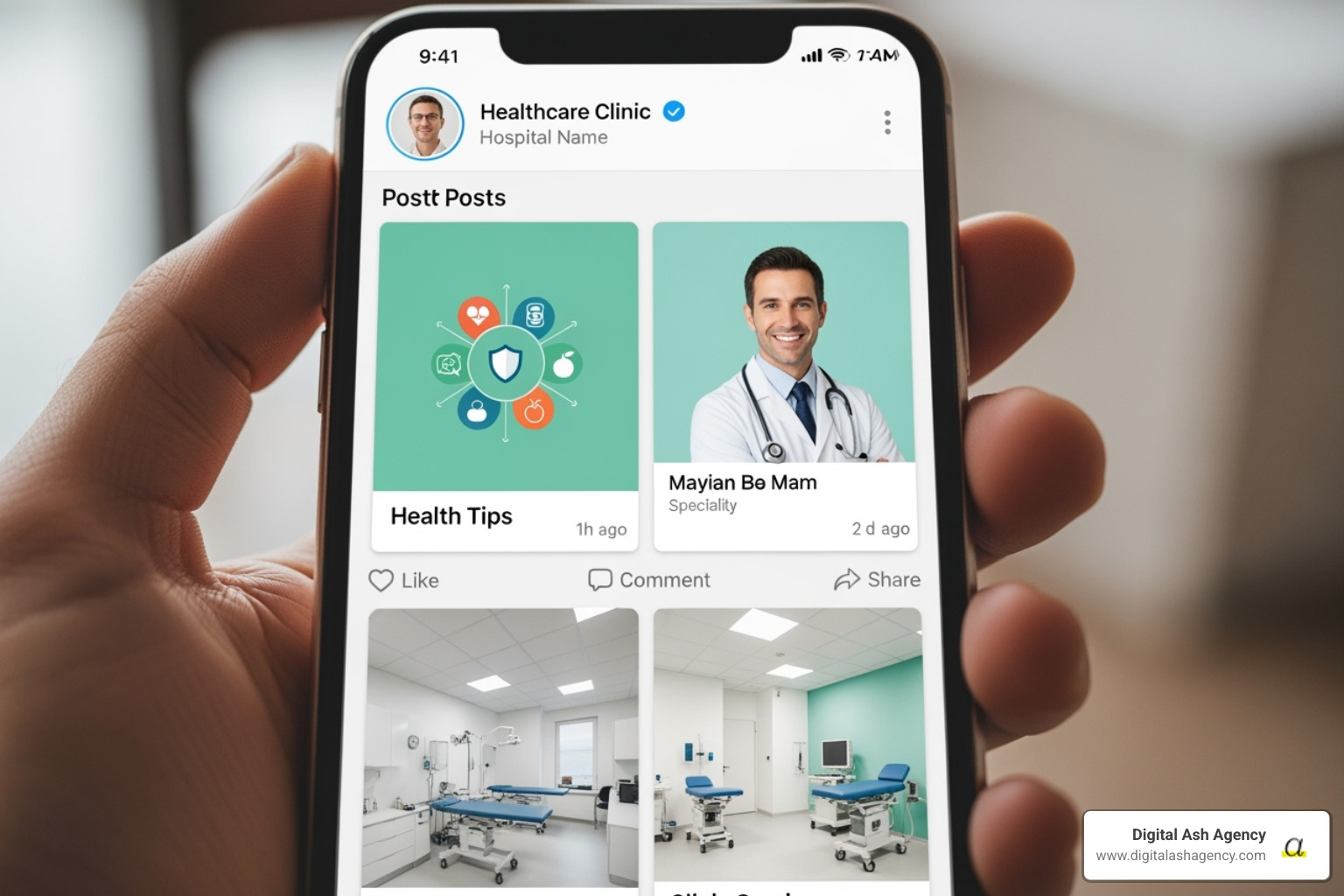
Why Healthcare Content Marketing is Essential for Modern Practices
Healthcare content marketing is a strategic approach to creating and distributing valuable, educational content to attract, educate, and retain patients. By sharing expert knowledge through blogs, videos, and social media, you help patients make informed decisions and build trust in your practice. This involves a focus on patient education, credibility, digital presence, HIPAA compliance, and long-term relationship building.
The numbers tell a compelling story: 7% of all Google searches are health-related, and 77% of patients research healthcare providers online before booking appointments. This shift in patient behavior makes a digital presence essential. Yet, only 28% of healthcare marketers have a defined content strategy, despite 99% of those who invest in content marketing reporting positive results.
For practices in crowded markets or facing non-compete restrictions, content marketing is a powerful tool to build community connections and demonstrate expertise without traditional advertising.
I'm Ashley Gay, a branding expert who used strategic healthcare content marketing to help my physician husband's practice bill $239K in its first 90 days. My experience proves that the right content strategy can transform patient acquisition and practice growth.

Healthcare content marketing terminology:
Building Your Strategic Blueprint for Success
Today's patients begin their healthcare journey online, searching for answers and providers they can trust. Yet, only 28% of healthcare marketers have a clearly defined strategy, missing opportunities to connect with patients when they need it most. Your healthcare content marketing strategy is a roadmap to building meaningful patient relationships through helpful, trustworthy information.
Building your strategy starts with understanding your patients. Create detailed patient personas to address their real concerns. Next, map the patient journey—from their first Google search to becoming a loyal advocate—to identify opportunities to provide value. Set clear, measurable goals, such as increasing new patient appointments by 25% or improving retention rates. Finally, identify what makes your practice unique. Your specialized training, community involvement, or compassionate approach should be the foundation of your content. Current trends like telehealth promotion and personalized video content are also key, as 42% of consumers are more likely to schedule with providers who offer helpful content.
The Essential Components of a Healthcare Content Strategy
- Content Audit: Review your existing content to see what's working and identify gaps. You might have general health tips but lack content on your specialty's most common concerns.
- Keyword Research: Find what your patients are searching for. Understanding their questions allows you to create content that directly answers their needs and helps them find you.
- Content Calendar: Plan your content around seasonal topics, awareness months, and educational series to build trust over time. Consistency is key.
- Promotion Plan: Your content is useless if no one sees it. Plan how you'll share articles and videos across your website, social media, and email newsletters.
- Budget Allocation: Focus resources on high-impact content and channels that effectively reach your target patient population.
- Performance Indicators: Track meaningful metrics like new patient inquiries, appointment bookings, and patient retention to measure your content's impact on practice growth.
Why Your Practice Needs Healthcare Content Marketing
In a world of health misinformation, your practice can offer trusted, expert guidance. By consistently sharing accurate, easy-to-understand health information, you build authority and become a trusted health partner. This educational approach helps in growing your patient base more authentically than traditional advertising. Better patient education leads to better patient outcomes, as informed patients are more likely to follow treatment plans. Sharing insights and explaining complex topics demonstrates your expertise and fosters patient loyalty far beyond the exam room. The results are clear: an impressive 99% of healthcare companies that invest in content marketing report positive results. This is a proven strategy for building patient relationships and growing your business.
For more insights on developing comprehensive marketing approaches, explore our guide on Healthcare Marketing Strategies.
Creating Content That Cures: Best Practices for Trust and Compliance
When patients search for health information, they are often vulnerable. Your healthcare content marketing can either increase their anxiety or offer comfort and clarity. Trust is built through consistent demonstration of expertise, care, and accuracy. The foundation of trustworthy content rests on E-E-A-T principles: Expertise, Experience, Authoritativeness, and Trustworthiness. Your content must showcase your medical training, highlight your experience, and prove your commitment to accuracy.
Speaking in plain language is crucial, as many adults struggle with health literacy. Citing credible sources like peer-reviewed studies and reputable medical organizations transforms your content from opinion into education. This is vital, as 87% of patients state it is important that health information is reviewed by a medical professional. When you consistently provide valuable, accurate information, you establish thought leadership and build the trust that turns visitors into patients.
Navigating HIPAA and Ensuring Credibility
HIPAA compliance is a sacred trust. When creating content, patient privacy is paramount. Understanding HIPAA compliance guidelines is non-negotiable. Every patient story or case study must be carefully anonymized or created with explicit written consent to protect patient health information.
This is even more critical given widespread consumer distrust. 52% of Americans worry that online health content isn't credible, and 47% suspect it's primarily trying to sell them something. Your content must overcome this skepticism by focusing on education over promotion. Furthermore, 60% of consumers would feel violated if their clinical data was used for targeted advertising without consent, highlighting the need for ethical data handling in all marketing efforts.
Top-Performing Content Formats for Healthcare
Successful healthcare content marketing uses a variety of formats to engage different patients:
- High-quality blog posts: These are the backbone of your strategy, covering everything from condition explanations to preventive care tips. When optimized for search engines, they become lasting resources.
- Educational videos: Video creates a personal connection, whether you're explaining a procedure or introducing your team. It makes complex topics easier to understand.
- Interactive tools: Simple tools like a BMI calculator provide immediate value and position your practice as a helpful resource.
- Patient success stories: With consent and anonymization, these narratives showcase the human side of your expertise and help prospects envision positive outcomes.
- Downloadable resources: Ebooks and whitepapers establish your authority and generate leads from patients who are genuinely interested in your services.
For more ideas, explore our guide on Marketing for Clinics.
Amplifying Your Message Across Digital Channels

Creating great content is just the first step. The real impact of your healthcare content marketing comes from reaching the right people at the right time. A multi-channel approach ensures your expertise reaches patients wherever they are seeking information.
Your website is your digital front door. It must have lightning-fast load speeds and a mobile-first design, as over half of your potential patients browse on their phones. A site that takes longer than three seconds to load will lose 53% of visitors.
Local SEO is critical for connecting with your community. When someone searches for a "family doctor near me," you need to appear first. We optimize your Google Business Profile with accurate hours, patient reviews, and photos to ensure you're found when your community needs you.
Social media is a key research tool for patients, with 42% of consumers using these platforms for health-related information. Use it to show the human side of your practice, share health tips, and build connections while remaining HIPAA compliant.
Email marketing is a powerful tool for nurturing patient relationships. A monthly newsletter with valuable health information, reminders, and practice updates keeps you top-of-mind as a helpful health partner. This approach is central to effective Digital Marketing for Doctors.
The Power of Personalization in Healthcare Content Marketing
Personalized healthcare content marketing makes patients feel understood and cared for before they even visit. Generic advice is ineffective; content that speaks to specific situations and health journeys builds powerful connections.
Using patient data ethically and with consent, we can create highly relevant content, such as sending diabetes management resources to newly diagnosed patients. This thoughtful approach delivers results: 42% of consumers are more likely to schedule an appointment with providers who offer personalized content. Personalization goes beyond using a first name; it's about understanding patient needs and preferences. However, privacy is paramount. With 60% of consumers wary of their data being used for advertising, our focus is on building relationships through helpful content, not pushy tactics. When done right, personalization feels like exceptional patient care.
Measuring What Matters: Tracking ROI and Success
Effective healthcare content marketing requires proving that your investment yields measurable results. Measurement is your compass, showing you what's working and where to focus your efforts for practice growth. We establish Key Performance Indicators (KPIs) that align directly with your goals.
- Website Traffic and Rankings: We track how many potential patients find you online and which content resonates most. Using Google Analytics, we see which blog posts answer patient questions and drive them to contact you.
- Conversion Rates: Traffic alone isn't enough. We measure how many visitors book appointments, fill out forms, or download guides. A small conversion rate can translate to a significant number of new patients.
- Social Media Engagement: We look beyond follower counts to track meaningful interactions like comments, shares, and direct messages. These conversations build the trust that leads to appointments.
- Patient Feedback and Reviews: With 90% of patients choosing providers based on online reviews, we monitor feedback religiously. Positive reviews are powerful marketing tools, and addressing concerns shows your commitment to patient satisfaction.
By tracking the patient journey from first click to scheduled visit, we can double down on what works. When we can show that a blog post led to new consultations, content marketing transforms from an expense into your most valuable investment for sustainable Healthcare Business Growth.
Inspiring Examples of Healthcare Content in Action
Real-world examples show how smart healthcare content marketing builds trust and educates patients. These organizations have successfully grown their reach with different strategies.
Mayo Clinic's Health Library: This is the gold standard for medical content. They've built a comprehensive library of articles in plain language, establishing themselves as the trusted resource for health information. Their blog also features real patient stories, which builds confidence and humanizes their care.
UnitedHealthcare's "We Dare You" Campaign: This interactive campaign made health fun. It challenged participants with small, achievable actions (e.g., drink more water, take the stairs) and used social media to create a community around wellness, building positive brand associations.
Asbestos.com's Data-Driven Content: By conducting original research, such as their study on the lingering effects of 9/11, this organization provides public value while establishing itself as an authority. This type of content earns media attention and valuable backlinks.
New York Presbyterian Hospital's Patient Stories: They share detailed video and print stories focusing on the relationship between patients and their care teams. By highlighting compassion and communication, not just successful outcomes, they build a powerful emotional connection with potential patients.
These examples show that success comes in many forms, from resource libraries and wellness challenges to data reports and authentic patient stories. The key is providing genuine value and building trust.
Frequently Asked Questions about Healthcare Content Marketing
Healthcare practices often have the same questions about connecting with patients in a digital world. Here are answers to the most common concerns.
How is healthcare marketing different from other industries?
Healthcare content marketing is unique. Unlike retail or other services, it requires navigating:
- Stricter Regulations: HIPAA compliance is paramount. You need explicit written consent for patient stories, and all content must be vetted to protect patient information.
- Higher Need for Trust: The consequences of incorrect medical advice are severe. With 52% of Americans worrying about credibility, your content must be impeccably accurate.
- Focus on Education Over Sales: Patients are skeptical of a hard sell. The goal is to be a helpful resource, not a pushy advertiser, as nearly half of people suspect health content is just trying to sell them something.
- Sensitive Topics: Content often addresses deep fears and vulnerabilities, requiring an empathetic and respectful tone.
- Longer Consideration Cycles: Patients research extensively before choosing a provider. Your content must build trust over time.
What types of content are most effective for attracting new patients?
The most effective content is genuinely helpful. Focus on:
- SEO-Optimized Blog Posts: Answer common patient questions like "what to expect during physical therapy." This naturally attracts people who need your services.
- Educational Videos: Humanize your practice by explaining procedures or introducing your staff. A simple video tour can ease patient anxiety.
- Patient Reviews and Testimonials: With proper consent, these provide powerful social proof, as 90% of patients check online reviews before choosing a provider.
- Localized Content: Show you're invested in your community by writing about local health initiatives or events.
How can a small practice get started with content marketing?
You don't need a massive budget to start healthcare content marketing. Begin with simple, focused efforts:
- Start a Blog: Write about the questions patients ask you most frequently. This provides immediate value and showcases your expertise.
- Optimize Your Google Business Profile: This free tool is often a patient's first impression. Ensure it's complete with accurate hours, services, and photos, and encourage reviews.
- Focus on One or Two Social Media Channels: Concentrate your efforts where your patients are most active, like Facebook. Share blog posts and quick health tips.
Consistency is more important than perfection. For personalized guidance, Healthcare Practice Consulting can provide the strategic support you need.
Conclusion
Healthcare content marketing is the bridge between your expertise and the patients who need your care. It transforms your practice into a trusted community resource. The future of healthcare is built on trust, education, and genuine human connection. Patients are looking for providers who act as partners in their wellness journey.
By developing a clear strategy, adhering to compliance, creating valuable content, and measuring your results, you can build the trust that leads to practice growth. As we've seen from leaders like Mayo Clinic, the most successful organizations are those that consistently show up for their communities with trustworthy information.
Start by answering your patients' most common questions. Focus on being genuinely helpful, and the growth will follow. Your content can be the reassuring voice that guides a worried patient toward the right care.
Ready to transform your practice's digital presence and build deeper connections with your community? Contact us for expert guidance on your healthcare marketing strategy. At Digital Ash Agency, we understand the unique challenges healthcare practices face and specialize in building the meaningful relationships that help you thrive.
Let's create content that serves your patients and grows your practice.









